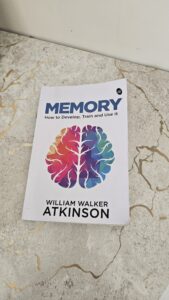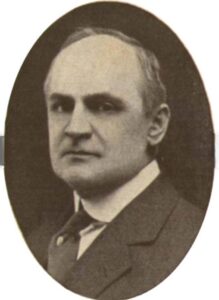“Memory, like every faculty of the mind, or every muscle of the body, improves and develops by intelligent and reasonable use and exercise.”
Do you find yourself struggling to remember things?
Particularly as I get older, the facts seem to fade, I meet an old associate and the name evades me, timelines get blurred, and I just have to try a bit harder to recall things that earlier just came to mind almost immediately when needed.
I was looking to understand how memory works and if it can be improved at all – and I found this book.
Memory – How to Develop, Train and Use It.
– by William Walker Atkinson


William Walker Atkinson was born in 1862 in Baltimore. He was a successful lawyer for many years until the stress of the profession resulted in a physical and mental breakdown. In search for healing, the next phases of his life became diverse and interesting – he became a writer, editor and publisher in the fields of ‘New Thought’, Yoga, divination and personal success. As you read this book, remember that this is written in the 1900s and the style and prose are from those times.
The book is a short read – and is written in a way that anybody will be able to grasp the contents, regardless of the age of the reader.
Recollection vs Remembrance

“..we remember by chance, but recollect by intention..”
The book begins by looking more closely at the concept of ‘memory’ and why it plays an important role in the development of character and individuality.
Frankly, my main reason for looking into this subject was to save myself from embarrassment. I hate it when I forget someone’s name. Recently, I was talking to a small group about this great book I had read and for the life of me, I could not recall the author’s name. It did come to me eventually – but those few awkward seconds felt like hours!
The introductory chapter of this book changed my whole perspective about why a good memory matters. If you think about it, the ability to recall past impressions on the mind is quite powerful and crucial – for better judgement, better learning, timely inspiration, recognizing patterns etc. etc.
The book explores how to improve your ability for mental impressions – it sounds quite tough and probably is. But if you’re looking for a good reason to try anyway, just visualize a situation of memory failing you at a very important moment.
Cultivation of the Memory
“This book is written with the fundamental intention and idea of pointing out a rational and workable method whereby the memory may be developed, trained and cultivated.”
Chances are that you often credit someone for having a good memory – like it is natures gift. However, Atkinson proves beyond doubt that this is not the only way. You can, as a matter of fact, improve your memory. It requires effort and patience – but it can be done.
“..the three essentials in the cultivation of the memory: 1) Use and exercise; review and practice; 2) Attention and Interest; and 3) Intelligent Association.”
The question then is – if indeed you are willing & capable of making the effort, how much can you improve? Well, there is really no limit.
For instance, as a Hindu, I often have religious ceremonies in which Brahmins (learned priests) are invited. They are able to recite ‘shlokas’ or verses from religious texts for hours without looking at a single page, modulating their pitch as they go along for certain words – all without missing a beat.
This is not a gift. It is the result of continuous practice.
There are a few systems that are mentioned in the book for cultivating the memory. One of which talks about the idea of ‘contiguity’ i.e. recollection is assisted by the way words are strung together. Ever heard the song A-B-C that toddlers pick up when trying to learn the alphabet? Memorizing the order of 26 alphabets may be tough – but the way they string together makes it impossible to forget particularly in a sing-song way. There is a science behind that. And that is the mind’s tendency to remember ‘by association’.
The Secret
Do you ever wonder how exactly do we ‘remember’ things?
Atkinson calls it the “Sub-Conscious Record-File”.

“..the sub-conscious mind…(is where) the activities of memory have their seat.. Only when the sub-conscious record is represented in the conscious field.. recollection or remembrance results..
..the highest form of memory is the unconscious – when what we wish to recall comes to us spontaneously, without any conscious thought or search for it.”
This makes things a bit more difficult. It’s hard enough to train your conscious mind, imagine having to train your sub-conscious mind – I mean, that is inconceivable.
Or is it?
Atkinson argues that it is totally possible. He states that this memory region in the sub-conscious is a great big record file of all impressions that have been made on the mind. And like any good record file – its effectiveness depends on it being thoroughly organized. Imagine a big storeroom with millions of records classified properly based on rules – it would be easy(ier) to find something in there, wouldn’t it?
So how do you ensure that:
- impressions are properly received
- are properly organized; and finally
- are retrieved quickly on demand
Attention
Attention is the stuff memory is made of – we all know that much. We also know that one of the most common causes of poor attention is a lack of interest.
Atkinson argues that “interest may be developed by voluntary attention” i.e. instead of adopting some weird acronym to remember something boring in history class – try cultivating an interest by voluntarily paying attention. Of course it requires the application of will but it can make the process a whole lot easier.
Cultivating voluntary attention means training your mind to focus on uninteresting details – and doing that until you can describe them in a great amount of detail. You will be surprised that suddenly, a slightly sluggish response of the mind suddenly becomes a bit more alert.
“This will prove tiresome at first, but you must stick to it.”
Presence of mind, in simple words. You don’t just look at something, but really see it. You don’t just hear something, but actually listen.
Association
“..the recording power of memory mainly depends upon the degree of attention we give to the idea to be remembered.”
However, the reproducing power ? That depends on the type of associations we make in linking that idea to others. Atkinson states that Association depends on two principles :
1) The law of contiguity – think about how you remember songs, the next line is associated with the previous one, this is your mind applying the law of contiguity.. Try recalling the song backwards and you will see the struggle.
2) The law of similarity – think about how you remember two different holidays regardless of time and space between them, simply because you missed flights on both occasions. This is your mind applying the law of similarity.
The 3 P’s of enhancing your memory
Practice. Practice. Practice.
The book has some interesting chapters on how to remember names, faces, facts etc. But ultimately the key is – learn to develop voluntary attention, consciously make associations when you want to remember something, repeat things you want to remember either to yourself or someone who’s willing to partner with you!
In other words – exercise your memory like you exercise your body. It will respond wonderfully because your subconscious is now aware that you will demand it to be alert and responsive. Frankly, this can be quite energizing!
“Nature has a way of putting to sleep, or atrophying any faculty that is not used or exercised; and also of encouraging, developing and strengthening any faculty that is properly employed and exercised.
In this you have the secret.”

Ruta
